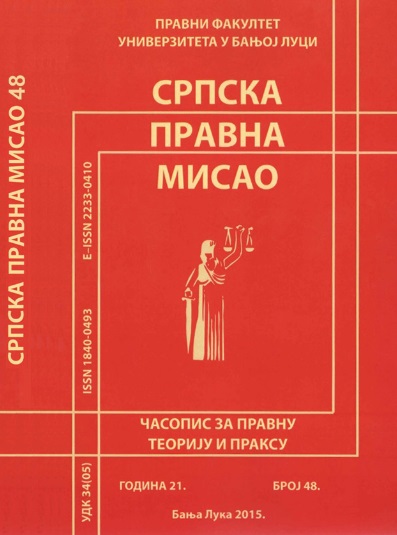НЕУСТАВНА РЕТРОАКТИВНА ПРИМЈЕНА ИНКРИМИНАЦИЈЕ ЗЛОЧИНИ ПРОТИВ ЧОВЈЕЧНОСТИ У ПРАКСИ СУДА БОСНЕ И ХЕРЦЕГОВИНЕ
UNCONSTITUTIONAL RETROACTIVE IMPLEMENTATION OF INCRIMINATION OF CRIMES AGAINST HUMANITY IN PRACTICE OF COURT OF BOSNIA AND HERZEGOVINA
Author(s): Milan BlagojevićSubject(s): Law, Constitution, Jurisprudence, Criminal Law, Civil Law, International Law, Court case, Administrative Law
Published by: Правни факултет Универзитета у Бањој Луци
Keywords: crimes against humanity; wide attack; wide-spread attack; systematic attack; civilian population; war crimes; retroactive implementation of the law;
Summary/Abstract: Retroactive implementation of the criminal law is the question that attracts attention of publicity in Bosnia and Herzegovina for a long time. Reason for that is the fact that the Court of Bosnia and Herzegovina implements the Criminal Code of Bosnia and Herzegovina from 2003 in its verdicts related to the criminal events that had happened between 1992 and 1995. What kind of problems can be caused by this practice can be seen in the best way in relation with incrimination of crimes against humanity. This incriminatin had not been prescribed by law during the war in Bosnia and Herzegovina. It is prescribed only by the Criminal Code of Bosnia and Herzegovina from 2003. State prosecutor is accusing by this incrimination some persons for the criminal events from period between 1992 and 1995, and after that the Court of Bosnia and Herzegovina pronounce the persons guilty for the same incrimination. It is the model of unconstitutional retroactive implementation of this incrimination and this problem is the subject of this paper. In the paper appropriate uncostitutional decisions of Court of Bosnia and Herzegovina, and Constitutional court of Bosnia and Herzegovina as well, are exposed and criticised. Unfortunately, these decisions got an affirmation by the European Court for Human Rights. That is why the practice of this court related to this problem is also criticised in the paper. After that the author has exposed the reasons by which can be explained such judicial practice, and the consequences which might arise from that in the future.
Journal: Српска правна мисао
- Issue Year: 2015
- Issue No: 48
- Page Range: 233-260
- Page Count: 28
- Language: Serbian

